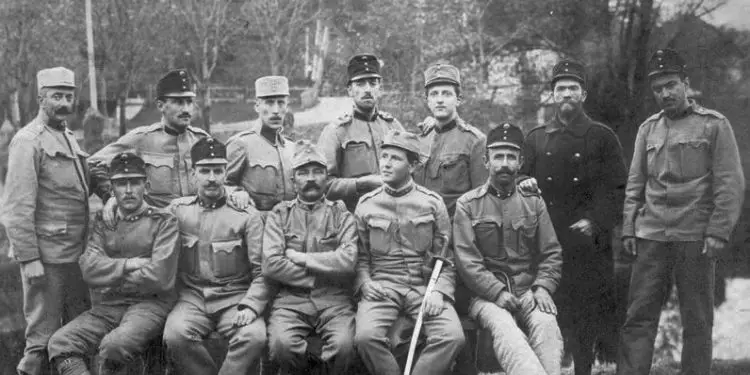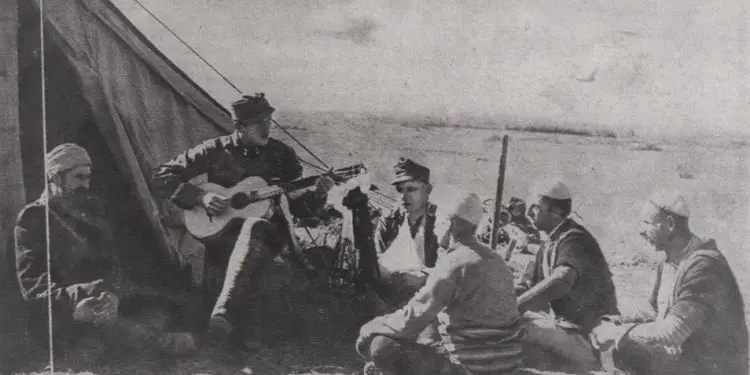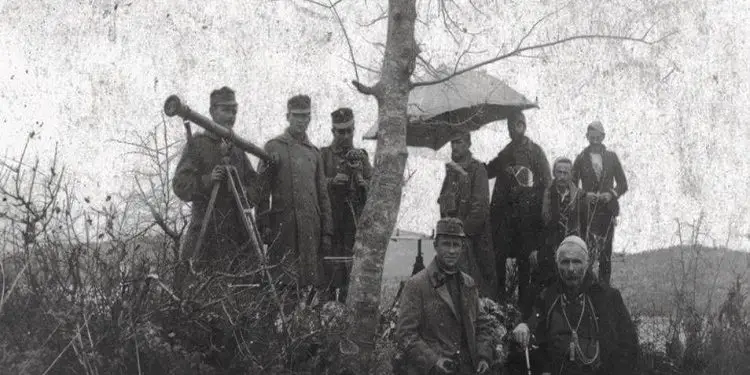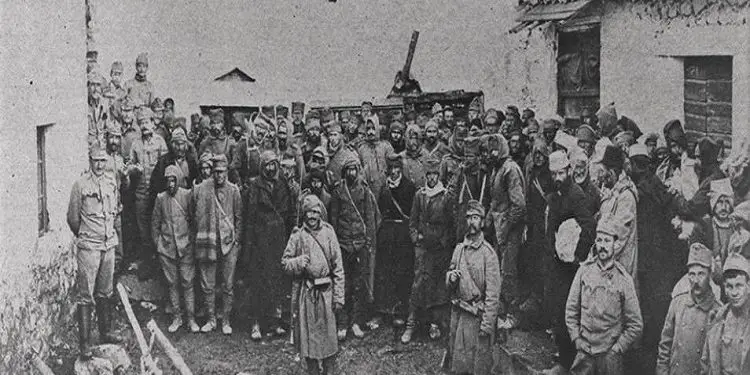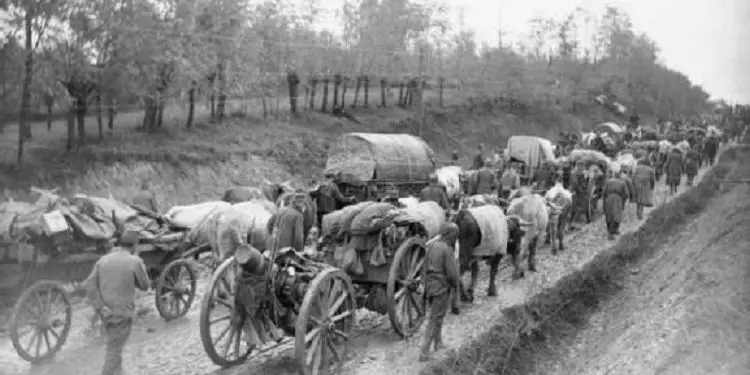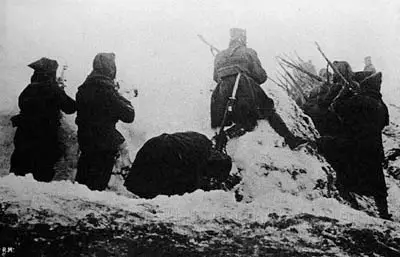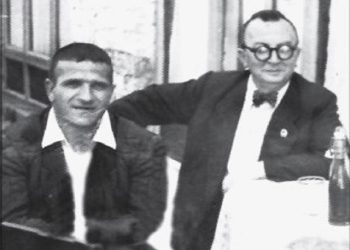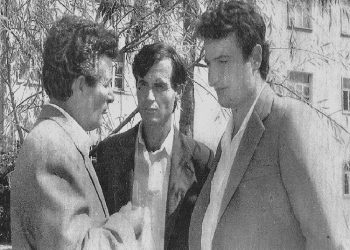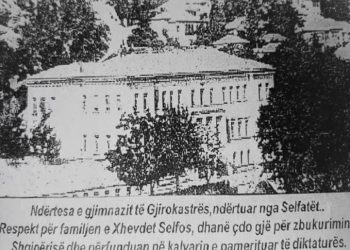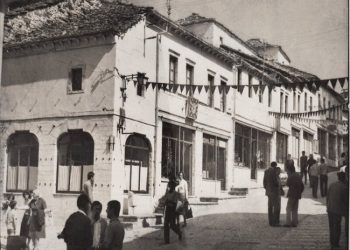From Bashkim Trenova
Part sixteen
Memorie.al / “Serbs are descended from the Slavs, a large number of tribes who gave life to the Slavic peoples. Knowledge about the origins of the history of the Slavs is modest and not so clear. Their name appears for the first time in the 6th century AD, when Byzantine writers start talking about the Slavs….”! (Dushan Bataković, Milan St. Protic, Nikola Samardžić, Aleksandër Fotic. History of the Serbian People. L’Age d’Homme. Lausanne. 2005. Pg. 3.)
MYTH-MYSTICISM, VICTIMOMANIA, RACISM AND SERBONOSTALGIA
ALBANIANS ACCORDING TO THE SERBS
(THE EASTERN CRISIS AND THE BALKAN WARS)
Over the Arnaut population of Peja, Gjakova and Prizren, death hung like a ghost night and day. He who went down alive was not sure that he would wake up alive. The Montenegrin atrocities against the Krasniks can be worthily compared with the barbarism of the Serbian army on the River: the same methods, the same rudeness, the same thirst for blood. (2)
—
That Arnaut belt, which covered the old Serbian border from Mitrovica to Vranje, has been completely exterminated. Grave silence reigns in Kosovo. Only here and there does a vindictive rifle crackle, which, as one of the most prominent functionaries in these areas once assured me, is caused by the “non-tactical” attitude of our authorities. (1)
—
If we take all this into account: that no one has answered for the lives of Albanians, that the army has suddenly fallen into the primitive habits of life with its wild logic of force, that all sources of life have been cut off, that people and cattle are left without food. If all this is taken into account, then we have before us a typical case of how uprisings start.
Not to mention the terrible scenes of misery and hunger, which have been played out in Shkodër and other places where the forcibly displaced Albanian population is concentrated. (1)
The inhumane behavior of the Serbs towards the Albanians was reinforced by the prediction that the wild dream of the Serbian bourgeoisie of conquering half of the real Albania would come true. – And who dares to accept such a foreign and, moreover, very alive and stable element? The militaristic gentlemen and owners had come to the conclusion that that Albanian generation had to be wiped out at all costs, from Karadak to Novipazar. (2)
1 – Dimitrije Tucevic. Sabrana came out. (Selected works). Book 7. Rad, Belgrade, 1980. Pg. 162-163.
2 – Right there. Pg. 196-197.
—
By occupying these countries, the Turks did not carry out the extermination of the then kneeling population, as the governments of the Balkan bourgeoisie do today. The Turks did not accompany the conquest of these countries with systematic extermination, as this did not correspond to the feudal interests of the sultan. Behind the war line of the victorious army, a systematic slaughter was prepared for the foreign people. (3)
—
The ruling circles of the Balkan states, as heirs of the Turkish power, followed the path of barbaric principles, which even Turkey did not implement to such an extent; graves and gallows are greater teachers than new constitutions.(4)
—
But the Albanians soon found themselves between a rock and a hard place, between the Turks, against whose yoke they had fought, and the Balkan states, which brought them a new yoke. Serbia pursues and persecutes the Albanians in all four districts; Montenegro penetrates from the North towards the heart of the northern Albanian tribes. (5)
1 – Dimitrije Tucovic. Sobrana dela (Selected works). Book 7. Rad, Belgrade, 1980. Pg. 209.
2 – Right there. Pg. 213-214.
3 – Right there. Pg. 222-223.
4 – Dimitrije Tucovič, Sabrana dela (Selected works). Book 8, Rad, Belgrade, 1980. Pg. 25.
5 – Right there. Pg. 50.
—
The occupation of the Serbian army extended from the east to the very doors of the gorges and mountain passes. It separated the farmer from the field, the cattle from the pasture, the flock from the trough, the village from the mill, the buyer and seller from the market, the suburbs from the city, it separated all the mountain settlements from their natural centers and the barn for food. The Albanian from that side did not have to cross over to his land, which was left on this side. All sources of life were cut off. Desperate and starving, the people at first begged for free access to the market, and when this was denied them, between death by starvation and death by bullets, they chose the latter.(1)
—
The bourgeoisie in the new provinces of Serbia has imposed a state of emergency. Under the pretext of giving the residents of these municipalities time to “develop” to exercise their constitutional rights, the Serbian rulers actually tried to turn the national minority into a majority through the arbitrary police regime, while the residents there prepare them not as free citizens but as subjugated citizens.
This regime of extraordinary police measures, which is inspired by the reactionary goals of favoring some and persecuting others, has deprived the population even of the political freedoms it had under Turkish rule and has left it without any protection or control public, at the mercy of the corrupt bureaucracy. On the other hand, it creates new pretexts for the hardening of relations between the small states of the Balkans and the promotion of intolerance and hatred between the peoples. (2)
The Arnauts, when they learn that they are near, are greatly afraid of the Muscovites, and know that they cannot prevent them from reaching the Adriatic Sea. The Russians volunteered, sent huge supplies of medical equipment and supplies. Tsarist Russia was with Serbia with all its forces at that time. (1) The Serbian newspapers of October 1912 write that 80 Cossacks arrived in Belgrade.
****
Dorde M. Srbulovic – historian:
1 – Dimitrije Tucovic, Sabrana dela. (Selected works). Book 8. Rad, Belgrade, 1980. Pg. 99-100.
2 – Right there. Pg. 130-131.
****
Dragoljub M. Dinič, major general, professor and writer:
After the revenge of Kosovo and after the solemn entry into the royal Prizren, where the troops of the Shumadia division arrived, our 19th regiment passed through the streets of Prizren… The cold wind… warned of snow and harsh winter on the eve of Saint Dimitri. Both officers and soldiers were under the impression of glorious victories. Everyone was excited and proud… Even the glorious falcons led by the hand of God and the Star of Karagjorgjevic, were just sitting around Prizren when the news came: “Towards the sea, towards the Adriatic”.
The descendants of the Serbs, who once lost the battle in Kosovo, now seem to descend from the sky…even they want to plant the flag of Serbia even across the Albanian mountains and the snowy Alps, across the nests of bandit Albanians, in the Adriatic Sea. (2)
****
Dushan Bataković – professor of history at the University of Belgrade, ambassador:
1 – Dorde M. Sulovic: Srbi i Srbija sto godina posle Kumanovo. (Les serbes et la Serbia cent ans après Kumanova – Serbs and Serbia 100 years after Kumanovo). Nemanja. 28; 10. 2012. Pg. 2.
2 – Dragoljub M. Dinic. Prvi Put Kroz Albaniju sa Šumadijskim Albanskim Odredom 1912: Prizren-Drač. (For the first time in Albania. With the Albanian detachment of Shumadia in 1912; Prizren-Durrës.) Kragujevac 1922. Pg. 3-4.
After the liberation of Pristina (October 22) and the victory in Kumanovo (October 23-24), the war for Old Serbia and Macedonia ended. In Kosovo and Metohija, the Serbs welcomed the Serbian and Montenegrin armies with joy. The entire Third Army participated in an official liturgy in Graçanica to mark the liberation of Kosovo. Military authorities have issued proclamations in Pristina and other cities. Through them, the ethnic Albanians are asked not to resist and to surrender their weapons. The liberation of Old Serbia, however, was not the final objective of the Serbian armies; it sought an independent “Greater Albania”, including the cities of Manastir, Ioannina, Skopje, Pristina and Prizren.
Boarding an Austrian ship, Qemali sailed to Vlora to proclaim Albania’s independence. Gathering together the feudal and tribal leaders of the southern provinces, on November 28, 1912, Qemali announced the formation of an independent Albanian state. The Provisional Government of Vlora was a toy in the hands of Vienna, without any influence on the people. All documents, including the declaration of independence, were written in Turkish; no member of his cabinet knew how to write in the Albanian language. Ismail Qemali entrusted the military preparation to the leaders of the refugees from Old Serbia, Riza Bej Kryeziu and Isa Boletini.
The political and economic loop around Serbia, tightened by Austria-Hungary since the war (1906-1911) and the annexation of Bosnia-Herzegovina pushed Serbian diplomacy to resolve the issue of its political and economic independence by seeking a free outlet to the Adriatic. This was something similar to the project presented by Ilija Garashanin. The determination of the Serbian government to advance towards the Adriatic coast, in an ethnic Albanian area, was based on the assessment that the ethnic Albanians were “not a single people, but tribes separated and distant from each other, without language, alphabet and religion common”.
At the end of September 1913, about 10,000 ethnic Albanians invaded Serbian territory from two directions – Western Macedonia and towards Gjakova and Prizren. The initiator of the attack was Austria-Hungary. Ismail Qemali ordered the leaders of the Albanian refugees, Bajram Currin, Isa Boletini, Riza Beu and Elez Isufi, to attack Serbia with their men, promising that with the help of the Dual Monarchy and Italy, all the conquered territories would belong to Albania. Esad Pasha refused to join them and warned Serbia not to approve their action.
The weak Serbian border troops and some gendarmerie units could not withstand the attack. In the southern part, commanded by Bulgarian commissars, the insurgents manage to take Dibra, Ohrid and Struga and advance towards Gostivar. In the north, Isa Boletini, Bajram Curri and Qazim Lika take Luma, surround Prizren and, shortly after, occupy Gjakova. In early October, two divisions, the troops of the new regions, advanced towards Skopje and, after expelling the ethnic Albanians from Serbian territory, crossed into Albania to continue their pursuit.
At the same time, with the help of the Austro-Hungarian secret service, the Albanian leaders – Bajram Curri and Isa Boletini were preparing for a new incursion into Serbia. At the end of March 1914, several hundred ethnic Albanians crossed the border, after learning that an uprising against the Serbs had broken out in some villages near Rahovec. The uprising spread to four villages. Curri and Boletini planned to bring members of the International Control Committee to the rebel areas, where the local ethnic Albanians would express their desire for Gjakova, Peja, Prizren and the regions up to the Urosevc (Ferizaj) – Mitrovica railway to be annexed to Albania.
The incursions into Serbia, but above all the clashes with border posts and gendarmes, have never stopped since the beginning of the war. Even if they are few in number and always controlled quickly, they are increasingly disturbing the competent circles in Serbia. When a Serbian diplomat reported in late May that Esad Pasha’s position was hopeless and that Albanian militias had subsequently attacked the Serbian border in two places, the Serbian government decided to move its army and take up strategic positions in Albania. About 20,000 Serbian troops invaded Albania from three directions. Ethnic Albanians avoided facing large military formations; they preferred to dig wells for soldiers and refugees in distress in the high gorges, and then attack them.
The hardest battles were fought in Mirdita by a combined regiment of the Serbian army, which was ambushed at the mouth of the Fan River. About 800 ethnic Albanians, commanded by a Catholic brother, did not let the army pass. As the corps continued to advance into Montenegro, ethnic Albanians, in late October, began attacking lone soldiers, ethnic Albanians began attacking Serbian civil and military authorities, while the order to surrender their arms was met with strong resistance. Official buildings, villages and small military garrisons were attacked, while in November and until mid-December entire villages in Drenica and around Peja were emptied by the Serbian authorities.
The Austro-Hungarian monarchy was falling apart. In Belgrade, on December 1, 1918, the unification of Serbs, Croats and Slovenes into a single kingdom under the Karagjorgjevic dynasty was announced. In Kosovo, the military and civil authorities did not have time to rejoice. The Albanian stance, helped by the unrest in Albania, and with Italy behind it, announced a new movement, that of the Kachaks. Two Balkan armed conflicts and one global one have deepened old hatreds and created new hatreds between Serbs and ethnic Albanians. (1)
—
Two wars fought by Serbia and Montenegro, supported by the Russian Empire, against the Ottomans (1876, 1877-1878), ended with the defeat of the pro-Ottoman Muslims and the emigration of at least 30,000 Albanians from the liberated lands: today’s Serbia southeast and former Sanjak of Nish. On the other hand, tens of thousands of Serbs left parts of Old Serbia, mainly Kosovo… to reach the newly liberated regions. Their exact number has never been determined. Before the Serbo-Ottoman war (1877-78), Albanians constituted the majority of the population in some possessions of Sanjak i Nish (Toplica region), while Serbs were the majority in Vranje. Albanian villages were emptied after the war of 1877-1878. Not accepting the loss of their feudal privileges in a European-type Christian state, most Muslim Albanians emigrated to Metohija and Kosovo, venting their anger on the Serbian inhabitants. (1)
1 – Dushan T. Batakovic. Les Chroniques du Kosovo. Liberation du Kosovo et de la Metohie. (Chronicles of Kosovo. Liberation of Kosovo and Metohija). Balkania. Night. 1999.
—
With the first Balkan War (1912) the situation changed. A series of Albanian rebellions (1910-1912) accelerated the formation of a Balkan Alliance (Greece, Serbia, Bulgaria, and Montenegro). Pashiçi offered the Albanian leaders an “agreement on the unification of Serbs and Albanians in the province of Kosovo”. According to this agreement, ethnic Albanians would enjoy religious freedom, the use of the Albanian language in schools and municipal administration in the Kingdom of Serbia. In a large meeting, which took place in Skopje on October 10 (then in Pristina and Diber), the Albanians decided to defend their Ottoman homeland with weapons and to use the weapons received from Serbia against Serbia. (2)
—
At the end of July 1914, two days before Vienna declared war on Serbia, Austro-Hungarian consular officials in Albania received orders to supply and support the Albanian uprising on Serbian lands with all financial and military possibilities. Kosovo Albanian leaders in exile, Bajram Curri, Hasan bej Prishtina, Isa Boletini, have received significant support as well as arms and ammunition from Austria-Hungary to prepare armed uprisings and to break out a large-scale Albanian rebellion in the territories held by the Serbs in Kosovo and Metohija and in the northwest of Macedonia. 3)
When, during the withdrawal, the Serbian army… reached Kosovo, sabotage and assassinations by the Albanians were not few. In many villages of Kosovo, the Albanians refused to supply food, making no distinction between military and civilian refugees. In Istog, a small town in Metohija, on November 29, 1915, a tired Serbian column, following the main military column, was massacred by Albanian bandits. Near the monastery of Saint Mark of Korica (Sv. Marko Koriski) in the outskirts of Prizren, Albanians of the Kabash clan disarmed, stole and treacherously executed about sixty Serbian soldiers.
After the withdrawal of the Serbian army from Peja, the Albanians looted many Serbian houses and shops. Albanians also set up a well near Mitrovica (Kosovo), killing crushed soldiers and stealing unarmed refugees. A number of crimes have been committed against the Serbian civilian population in Suha Reka and elsewhere in the regions inhabited by Albanians, in the Kosovo region as well. (1)
****
1 – Dushan T. Batakovic. Serbia’s Kosovo Drama. A Historical Perspective, Belgrade. (The Serbian Drama of Kosovo. A Historical Perspective). Čigoja štampa, 2012. Pp. 58-59.
2 – Right there. Pages 74-76.
3 – Right there. Page 78.
****
Dushan Popovic – journalist, publicist and politician, secretary of the Serbian Social Democratic Party (SSDP):
Even the second expedition against Albania ended with the complete defeat of the Serbian government. On October 5, Austria-Hungary sent an ultimatum to Serbia, ordering it to withdraw all its troops from the territory of autonomous Albania within 8 days. Stunned and frightened by the sudden step of Austrian diplomacy, the obedient Serbian government declared that it would immediately act on the order. And so, while our neighbor stands with his fist rose above our heads, our troops, who wasted all that blood on strategic points, retreat quickly and in shame from whence they came.
We did not expect another end. Why did the Vienna government take such a brutal action…? All hypotheses are possible and undoubtedly each of them constitutes, at least to some extent, a part of the reason why the decision was made. But we think there is something else in between. We think that the decision on the Austro-Hungarian ultimatum was prompted, if not provoked, by the cruel attitude of our government and our command towards the people in Albania. The data, from reliable sources, about the actions of the Serbian army in the provinces that had rebelled, are terrible, even if you take them with a little reserve.
1 – Dushan T. Batakovic. Serbia’s Kosovo Drama. A Historical Perspective, Belgrade. (The Serbian Drama of Kosovo. A Historical Perspective). Čigoja štampa, 2012. Pg. 79.
Everything in the embryo is looted, destroyed, burned, ruined, slaughtered, annihilated there. Turgut Shefqet Pasha must pale with envy in front of Colonel Damjan Popovic. And as soon as we gather more facts and evidence, we will start the toughest campaign against this policy, which degraded the Serbian people’s aspiration for economic progress into a dirty attempt to use violence. And then we have no reason to be surprised by the fact that Austria, which is interested in the Albanian people, not in Albania, but also in it, with an ultimatum puts an end to this lightning and furious annihilation of a nation. (1)
****
Ivan Lovrič – journalist:
The battle for Kosovo has not stopped. Both today and a hundred years ago. And in these autumn months, Serbia is celebrating the centenary of the First Balkan War. And unfortunately she is still fighting a battle for her Kosovo and Metohija. The Dukić family keeps a letter, written exactly one hundred years ago. It is dated November 26, 1912. It was sent from the battlefield near Mitrovica, from Kosovo. The letter is addressed to our great-grandfather Milan, while his son and our grandfather Dragomir, an artillery sergeant, freed Kosovo from the centuries-old Turkish yoke – Dragomir’s grandsons, Ilija and Aleksandri, tell “Novosti”.
With this letter, the soldiers of the trench congratulate Milan Dukić, the father of his fellow soldier Dragomir, on the feast of the baptism of St. Olimpia.
1 – Dusan Popovic. Borba. 16.10.1914. Pg. 33-37.
The paper has yellowed, the purple ink faded after so many years. But not the memory of his grandchildren on his grandfather and other heroes, who did not spare their lives for the freedom of Kosovo.
– The letter, the congratulatory card, was sent by our grandfather Dragomir Dukić’s comrades-in-arms, non-commissioned officers, artillerymen, calling themselves “Kosovo’s avengers” – the Dukić brothers told us. –
– We, the grandchildren, have saved this letter from grandfather and placed it in a frame. It, in our house, stands under the glorious icon of St. Olympia – says Dukiçi. – Eleven Dukes left Donja Shatornja during the First Balkan War and all returned alive. But, in the First World War, half of them left bones on the battlefields of Old Serbia.
– From the hearth of our great-grandfather, Milan, from the hill where Dukić’s houses were, all five sons went to the First World War. Three did not return from that great war: their grandfather Dragomir Dukić, an artillery sergeant, died at the age of 35 in early 1915, his brother Dragutini, an infantry sergeant, died in 1915, at the age of 26, and their brother Tihomir, under sergeant of infantry, died near Manastir in 1916, at the age of 35. (1)
****
Ivo Andriç, writer – winner of the Nobel Prize for literature:
For us, the separation of Albania could not be seen otherwise, but only as a necessary and inevitable evil, which cannot be resisted, but also as a great evil from which we had to take advantage as much as possible. (2)
1 – Ivan Lovric. Dukići keep pismo staro sto godina. (Dukićs keep a hundred-year-old letter!) Novosti. 01.12.2012.
2 – Ivo Andrić (Étude d’Ivo Andrić, 89). Quoted by Dimitrije Bogdanović in Knjiga o Kosovo. (Book on Kosovo). Srpska Academy of Sciences. — Special editions. — Book DLXVI. — Primljeno na 7. Skupu Odeljenja jezika i književnosti, 25. decembra 1984, na ossov prikaza samog autora. — Belgrade, 1986.
—
With the division of Albania, the center of attraction for the Albanian minority in Kosovo will also disappear, which, in the newly created state, will be assimilated more easily. We will have, in this case, 200,000 to 300,000 more Albanians, but most of them are Catholics, and their relations with Muslim Albanians have never been good. Under the new conditions, the issue of the departure of Albanian Muslims to Turkey would be completed; there would no longer be any strong action to prevent it. (1) Memorie.al





